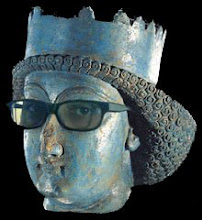 There is a theory put forth by Victor Turner that the bonds of community are formed through liminality. This means that by beginning in one state, entering into and experiencing a common in-between state (one that is not permanent but is also separate from the beginning state and the ending state), and then finishing in an entirely new state that can only be reached through the liminal state, people form into a community.
There is a theory put forth by Victor Turner that the bonds of community are formed through liminality. This means that by beginning in one state, entering into and experiencing a common in-between state (one that is not permanent but is also separate from the beginning state and the ending state), and then finishing in an entirely new state that can only be reached through the liminal state, people form into a community.An example of this liminal state would be bootcamp. Presently I have two friends who have joined the marines and are going through their 12 weeks of bootcamp. Before they left, they were private citizens just like the rest of us. However, once they climbed aboard that bus they were no longer private citizens... but they were also not fully marines. These next 12 weeks are going to be grueling and taxing but they are by no means going to last forever, they are only 12 weeks. But, at the end of this process, they will be marines. No longer will they be merely private citizens (even after their service has ended they are always known as "veterans" rather than just "citizens"), but they will be full-fledged marines. Other marines will see them as brothers. The uniform, the haircut, the look in their eyes, and sometimes the tattoos will make them fairly recognizable to others who have also passed through the liminal state of bootcamp. A community exists and the initiation into it (marking the permanent "citizenship" in it) was the bootcamp experience.
Religions function much the same way. Since I am a Christian, I will only talk about that experience here. One of the liminal states in Christianity (and perhaps one of the most important) is the conversion experience. Whether you are someone who can point to an exact moment when your heart turned to God or you went through more of a process, there was a time where you (to use the imagery of Jacob) wrestled with God. You had heard something or experienced something that challenged the ideas/beliefs/goals of your present community and you went through a time of reflection on those things. That time of reflection was liminal. It would not be (nor is it meant to be) permanent. People either eventually decide to move to the other side or they go back where they were and never completely pass through the liminal state. Anyone who calls themselves Christian (and actually understands what that means in a spiritual way rather than a cultural way... although cultural Christians are a community with an initiation as well) has experienced this liminality. That is why we call each other "sisters" and "brothers" because true community is really the same as a family bond.
I think this community is reinforced by entering into liminal states together regularly. These shared moments of limbo strengthen our family bond. Worship does this. In worship, we are not completely in this world... we are glimpsing into a world that is beyond (not to be too neo-platonic). We consciously enter this state and should come out changed (together) on the other side. Does worship do this for you? Does it do this for me? It should. We should not be able to enter into the presence of God together and come out the other side exactly the same as we went in. If that is happening, I would suggest that either you (and I) are not truly entering into worship or that our community as a whole is not.
There are many other liminal states within Christianity that further bind our hearts together. Service, suffering, miracles, etc. all serve this purpose. Mission trips, camp trips, a conversation... none of these are permanent but they should leave us changed and should strengthen our bonds of friendship... or better yet our family. If we don't enter into these states (they are scary if you think about entering into something that is inherently volatile since it is not permanent and it will enact change in your life) then we will never get to experience the community.


1 comment:
Most of my good and lasting friendships are because of this. How would I be friends with Rockwell?! (or people are completely different from me).
Postulancy is exactly this.
Worship does bridge the mystery between the incarnate and the divine.
Take care,
MC.
Post a Comment